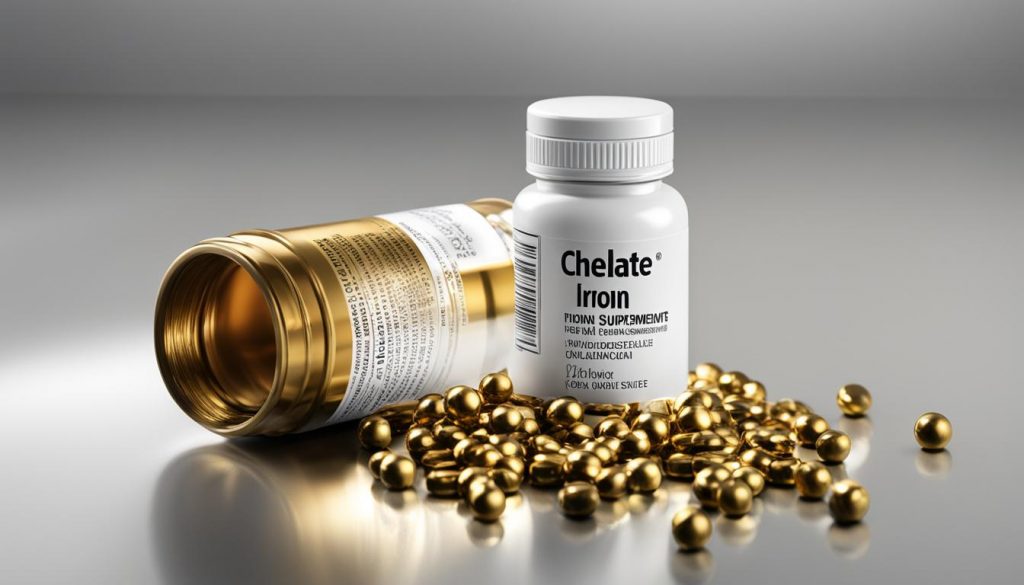Iron supplements that use chelation, or chelate iron supplements, are growing in popularity due to their capability to enhance the body’s absorption of iron. Iron deficiency anemia, a condition commonly identified by decreased iron levels causing weakness, fatigue, and hindered cognitive abilities, can be alleviated by these supplements. For those seeking to raise their iron levels without suffering from extreme gastrointestinal side effects, chelated iron supplements present a safe and efficient remedy.
Key Takeaways:
- Chelate iron supplements use chelation therapy to enhance iron absorption in the body.
- They are commonly used to prevent and treat iron deficiency anemia.
- Chelated iron supplements offer improved absorption and reduced gastrointestinal side effects compared to other forms of iron supplements.
- It is important to consult with a healthcare professional for proper dosage and usage guidelines.
- Chelated iron supplements can interact with certain medications, so it’s crucial to inform your healthcare provider about all the medications you are taking.
Understanding Chelated Iron and its Benefits
Chelated iron supplements offer numerous benefits, particularly in terms of iron absorption and overall effectiveness. Compared to other forms of iron supplements, chelated iron stands out as a superior option. One of its primary advantages is its ability to improve iron absorption in the body. The chelating agent employed in the supplement protects the iron from oxidation, enhancing its bioavailability and making it easier for the body to absorb.
This superior absorption of chelated iron can lead to quicker and more significant results in increasing hemoglobin levels and replenishing iron stores, making it an ideal choice for individuals with iron deficiency. Improved iron absorption allows for better utilization of the supplement’s iron content, ensuring that the body receives the maximum benefit.
Not only does chelated iron enhance absorption, but it also minimizes the occurrence of gastrointestinal side effects commonly associated with other forms of iron supplementation. Many individuals experience discomfort such as constipation when taking traditional iron supplements. However, chelated iron is known for causing fewer gastrointestinal issues, making it a more tolerable option for those who struggle with gastrointestinal side effects.
In summary, chelated iron supplements provide a range of advantages, including improved iron absorption and reduced gastrointestinal side effects. These benefits make chelated iron a preferred choice for individuals seeking an effective means of increasing iron levels and managing iron deficiency.
Enhanced Iron Absorption
The main benefit of chelated iron supplements is their ability to enhance iron absorption in the body. The chelating agent used in these supplements protects the iron from oxidation, ensuring that it remains in its bioavailable form. As a result, the body can absorb and utilize the iron more effectively, leading to faster and more noticeable improvements in iron levels and overall iron status.
Reduced Gastrointestinal Side Effects
One of the primary challenges with traditional iron supplements is their association with gastrointestinal side effects, such as constipation. Chelated iron, however, has been found to cause fewer gastrointestinal issues. This improved tolerability makes chelated iron a more convenient option for individuals who struggle with the adverse effects commonly experienced with other forms of iron supplementation.
Uses and Effectiveness of Chelated Iron Supplements
Chelated iron supplements are widely utilized for the prevention and treatment of iron deficiency anemia, a prevalent nutritional deficiency across the globe. This condition is particularly common among pregnant individuals and young children, necessitating effective interventions for improving iron status and hemoglobin levels. A wealth of research supports the use of chelated iron as an efficacious and well-tolerated option in addressing these concerns. Comparative studies have consistently shown the superior effectiveness of chelated iron over non-chelated forms, positioning it as one of the best iron supplements available for managing anemia.
Studies comparing chelated iron to non-chelated forms have demonstrated that chelated iron is often more efficacious and better tolerated. This makes it a preferred choice for individuals seeking the best iron supplement for managing anemia.
| Benefits of Chelated Iron Supplements |
|---|
| Enhanced iron absorption |
| Efficient increase in hemoglobin levels |
| Improved iron status |
| Reduced gastrointestinal side effects |
Chelated iron supplements offer several benefits over other iron supplements. One of the key advantages is their enhanced iron absorption. The chelation process facilitates the protection of iron from oxidation, making it more bioavailable and readily absorbed by the body. This improved absorption leads to faster results in increasing hemoglobin levels and replenishing iron stores, which is particularly crucial for individuals with iron deficiency anemia.
Chelated iron is often more efficacious and better tolerated than non-chelated forms, positioning it as one of the best iron supplements available for managing anemia.
Furthermore, chelated iron supplements are known to cause fewer gastrointestinal side effects, such as constipation, compared to other iron supplements. This increased tolerability makes chelated iron a favorable choice for individuals seeking effective and well-tolerated options for managing iron deficiency anemia.
Precautions and Safety Considerations
When it comes to chelate iron supplements, it’s essential to prioritize safety and proper usage. Although these supplements are generally considered safe, it’s important to use them under the guidance of a healthcare professional. Here are some precautions you should keep in mind:
- Consult a healthcare professional: Before starting any chelate iron supplementation, it’s crucial to discuss it with a registered dietitian, pharmacist, or healthcare provider. They can assess your specific needs, review your medical history, and provide personalized recommendations.
- Individualized approach: Supplements should be individualized to suit your unique requirements. What works for one person may not work for another. Factors such as age, underlying health conditions, and other medications being taken should be considered when determining the appropriate dosage and duration of supplementation.
- Vetting supplements: Not all chelate iron supplements are created equal. To ensure their safety and effectiveness, it’s essential to choose reputable brands and carefully vet the products you plan to use. Look for products that have been tested for purity, quality, and accurate labeling.
Iron supplements, including chelate iron, should not be used to treat, cure, or prevent diseases without proper medical supervision. It’s essential to follow the guidance of healthcare professionals who can monitor your progress and make any necessary adjustments to your supplementation plan.
Quote:
“Using chelate iron supplements without proper medical guidance can pose risks and may not yield desired results. Consulting a healthcare professional ensures safety, customization, and optimization of your iron supplementation.”
To illustrate, the following table gives an overview of common safety considerations when using chelate iron supplements:
| Consideration | Information |
|---|---|
| Pregnancy and breastfeeding | Chelate iron supplements may be recommended for pregnant individuals and breastfeeding mothers to meet their increased iron needs, but it’s crucial to consult a healthcare professional for proper dosage and monitoring. |
| Children | Children with iron deficiency may benefit from chelate iron supplementation. However, proper dosage adjustments must be made based on their age and specific nutritional requirements. |
| Underlying conditions | Individuals with conditions such as hemochromatosis (excess iron absorption) or liver problems should consult their healthcare provider before taking iron supplements, including chelated iron. |
| Medication interactions | Chelated iron supplements can interact with certain medications, such as bisphosphonates, levodopa, and quinolone antibiotics. Inform your healthcare provider about all the medications you are taking to avoid potential interactions. |
Dosage and Usage Guidelines
When it comes to chelating iron supplements, it’s crucial to understand the recommended dosage and usage guidelines to maximize their effectiveness. The appropriate dosage can vary depending on factors such as age, severity of iron deficiency, and individual needs. However, it’s essential to consult with a healthcare professional for personalized recommendations.
For adults with iron deficiency, the average daily dose of chelated iron typically ranges between 60 and 120 milligrams. This dosage ensures an adequate supply of iron to meet the body’s needs and correct any deficiencies. However, it’s important to note that individual requirements may vary, and your healthcare provider will provide specific instructions based on your unique circumstances.
It’s crucial to follow the dosage instructions provided by your healthcare provider to ensure proper absorption and avoid potential side effects. In some cases, taking chelated iron every other day may be recommended to improve tolerance and minimize gastrointestinal discomfort.
Remember to take chelated iron supplements with a glass of water or as directed by your healthcare provider to optimize absorption. It’s important not to crush or chew these supplements unless advised otherwise, as it may affect their efficacy. Additionally, it’s advisable to take these supplements on an empty stomach or with a light meal, as certain foods can interfere with iron absorption.
Always consult with a healthcare professional to determine the appropriate dosage and usage guidelines for your specific needs. They will assess your iron levels, consider any underlying conditions or medications, and provide tailored recommendations to ensure optimal iron absorption and overall well-being.
Dosage Guidelines for Chelated Iron Supplements
| Age Group | Dosage |
|---|---|
| Adults (18+) | 60-120 milligrams per day |
| Children (under 18) | Dosage determined by healthcare provider |
Potential Side Effects of Chelated Iron Supplements
While chelated iron supplements are generally well-tolerated, it’s important to be aware of the potential side effects. Common side effects may include:
- Upset stomach
- Diarrhea
- Constipation
- Stomach cramps
These side effects are usually temporary and may subside as the body adjusts to the supplement. However, it’s important to note that severe allergic reactions can occur, although they are rare.
One harmless effect of iron supplementation is the occurrence of black, tarry stools. This is a result of the iron’s reaction in the digestive system and is considered non-harmful.
If you experience any persistent or severe side effects while taking chelated iron supplements, it’s important to consult with a healthcare provider. They can provide guidance and determine the best course of action.
Interactions and Precautions for Chelated Iron Supplements
When taking chelated iron supplements, it’s crucial to be aware of potential interactions with certain medications. To ensure your safety and optimize the effectiveness of your iron supplementation, it is important to inform your healthcare provider about all the medications you are currently taking.
Some medications may have decreased absorption when taken with chelated iron. For example, bisphosphonates, levodopa, and quinolone antibiotics may interfere with the absorption of iron in the body. Therefore, it’s essential to consult with your healthcare provider to determine the best timing for taking these medications to maximize iron absorption.
Additionally, it’s important to avoid taking chelated iron supplements at the same time as antacids. Antacids can reduce the absorption of iron, so it’s recommended to wait at least 2 hours before or after taking antacids when consuming chelated iron supplements.
If you have specific medical conditions, such as hemochromatosis or liver problems, it is crucial to consult your healthcare provider before starting any iron supplements. These conditions may require specific considerations or monitoring when using iron supplements, and your healthcare provider can provide tailored guidance based on your individual needs.
“To ensure the safety and effectiveness of chelated iron supplements, it’s important to discuss potential interactions and precautions with your healthcare provider.”
By taking the necessary precautions and having open communication with your healthcare provider, you can ensure that chelated iron supplements are used safely and effectively to support your iron absorption and overall health.
Common Medications that May Interact with Chelated Iron Supplements:
- Bisphosphonates
- Levodopa
- Quinolone antibiotics
Precautions for Chelated Iron Supplements:
- Avoid taking chelated iron with antacids
- Consult with your healthcare provider if you have specific medical conditions
- Inform your healthcare provider about all medications you are taking
Conclusion
Chelated iron supplements offer a valuable solution for individuals looking to improve their iron absorption and manage iron deficiency anemia. With their enhanced absorption rate and reduced side effects, chelated iron is a preferred choice for many individuals. However, it is crucial to consult with a healthcare professional before incorporating these supplements into your routine. They can provide guidance tailored to your specific needs and ensure any potential interactions with other medications are considered.
By following the recommended dosage guidelines and discussing any concerns with your healthcare provider, you can optimize the benefits of chelated iron supplements for your overall health and well-being. Remember, chelated iron supplements should always be used under the guidance of a healthcare professional to ensure safety and efficacy. Take control of your iron levels and improve your health with chelated iron supplements.
When it comes to managing iron deficiency anemia, chelated iron supplements have proven to be a reliable choice. Their ability to improve iron absorption without causing severe gastrointestinal side effects makes them a popular option. However, it’s important to note that chelated iron supplements should not be used as a substitute for proper medical care. Always consult with a healthcare provider to determine the most appropriate treatment plan for your specific needs. With proper guidance and adherence to dosage guidelines, chelated iron supplements can play a crucial role in boosting your iron levels and improving your overall health.
FAQ
What are chelate iron supplements?
Chelate iron supplements are a form of iron that has been chemically altered to improve absorption in the body. Chelation is a process where metallic ions are bonded to non-metallic ions to create a new molecule. Chelated iron is often used to prevent or treat iron deficiency anemia.
What are the benefits of chelated iron?
Chelated iron offers improved iron absorption compared to other forms of iron supplements. The chelating agent helps protect the iron from oxidation, making it more bioavailable and easier for the body to absorb. It also causes fewer gastrointestinal side effects, such as constipation.
What are chelated iron supplements used for?
Chelated iron supplements are primarily used to prevent and treat iron deficiency anemia, which is a common nutritional deficiency worldwide. They have been shown to effectively increase hemoglobin levels and improve iron status in pregnant individuals and young children.
Are chelated iron supplements safe?
Chelated iron supplements are generally considered safe when used under the guidance of a healthcare professional. However, it’s important to consult with a registered dietitian, pharmacist, or healthcare provider to ensure their safety and effectiveness for individual cases.
How much chelated iron should I take?
The recommended dosage of chelated iron supplements can vary depending on factors such as age and severity of iron deficiency. The average daily dose for adults typically ranges between 60 and 120 milligrams. It’s important to follow the dosage instructions provided by your healthcare provider.
What are the potential side effects of chelated iron supplements?
Common side effects of chelated iron supplements may include upset stomach, diarrhea, constipation, and stomach cramps. These side effects are usually temporary and may subside as the body adjusts to the supplement. Severe allergic reactions are rare but possible. Black, tarry stools may also occur, which is a harmless effect of iron supplementation.
Can chelated iron supplements interact with medications?
Yes, chelated iron supplements can interact with certain medications. It’s important to inform your healthcare provider about all the medications you are taking to avoid potential interactions. Some medications, such as bisphosphonates, levodopa, and quinolone antibiotics, may have decreased absorption when taken with chelated iron. It’s also important to avoid taking chelated iron at the same time as antacids.
Should I use chelated iron supplements without medical supervision?
No, iron supplements, including chelated iron, should not be used to treat, cure, or prevent diseases without proper medical supervision. It’s important to use them under the guidance of a healthcare professional to ensure their safety and effectiveness for your specific needs.



